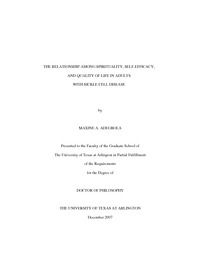| dc.description.abstract | For the individual with sickle cell disease (SCD), the lifespan is increasing but adults report decreased quality of life (QOL), low self-efficacy, and ineffective coping skills. The care of adult patients with SCD requires a complex multidisciplinary team approach with focus not only on physiological, psychological, and social needs, but also on spiritual needs. Quality of life, spirituality, and self-efficacy have been sparsely and separately studied in individuals with SCD. These three constructs have never been combined in one study in the adult SCD population.
Objective: The purpose of this study was to explore and describe the relationships among spirituality, self-efficacy, and QOL in adults with SCD. The specific aims were to: 1) describe the relationships among spirituality, self-efficacy, and QOL in adults with SCD, and 2) explore variation in these relationships based on selected demographic characteristics.
Methods: This study used a descriptive correlational design. Prospective participants, 18 years and older, with SCD who receive services from Sickle Cell Disease Associations were invited to participate in the study through a mail out and electronic survey. The instruments that were used include the Functional Assessment of Cancer Therapy-General (FACT-G) to measure QOL, the Functional Assessment of Chronic Illness Therapy-Spirituality (FACIT-Sp) to measure spirituality, and the Sickle Cell Self-efficacy Scale (SCSES) to measure self-efficacy.
Results: Individuals who reported high levels of spirituality and self-efficacy reported high levels of QOL. Reports of self-efficacy and spirituality predict QOL among adults with SCD. Spirituality and self-efficacy accounted for more than fifty percent, a significant amount of QOL variability. Spirituality accounted for 6.6%, and self-efficacy accounted for 34.6% of total variance in QOL. The ANOVA indicated no significant interaction between selected demographic variables and the study variables. There was strong correlation between spirituality, self-efficacy, and QOL, with correlation coefficients of .63 to .68.
Implications: This study provides information about the role that spirituality, self-efficacy, and QOL play in the lives of adults with SCD, and gives direction for developing holistic interventions with the inclusion of spirituality. | en_US |

